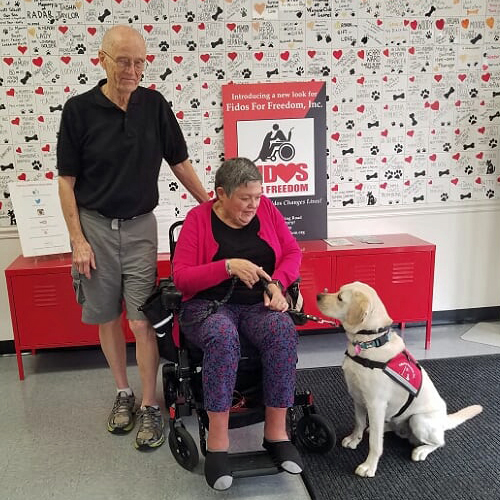Bitsy Anderson was literally teetering on the edge of a cliff when she started taking seriously the muscle weakness she had been feeling off and on for a while. She and her husband Terry were hiking in Utah, and she was stuck. She had lost her sense of balance, kept tripping over nothing, and needed help to get down off that mountain. In hindsight, symptoms like these had been creeping up on her for years.
That was twelve years ago, and Terry had just retired. The couple was planning to spend their golden years traveling. They had just bought a pair of matching bicycles. They had taken some paddling lessons and were about to buy a couple kayaks. But when they returned home after the hiking trip Bitsy was diagnosed with a rare muscle disease called inclusion body myositis (IBM), a disease that causes disability through increasing muscle loss in one’s legs and arms, difficulty grasping objects, and often trouble swallowing.
“IBM has pretty much changed our whole life,” says Bitsy, who leads the Maryland/Delaware/DC/Northern Virginia support group for The Myositis Association.
“It’s had an impact on both of us,” Terry says. “But it’s an impact we share, and we’re doing the best we can.”
Perhaps the hardest change for Bitsy was adapting to the loss of her independence. As her disease progresses, she’s had to give up driving, has trouble putting on her shoes and managing the housework, and she is always dropping things. She does not like having to constantly call on Terry just to get through the day. Fortunately, a fair-haired helper recently arrived.
Maya, an English Labrador retriever and Bitsy’s service dog, officially arrived in January of this year. Now it is her job to bring in the newspaper, help with the laundry, open the freezer, find things Bitsy has dropped, and dozens of other little tasks that make Bitsy more self-sufficient. She even helps Bitsy on with her jacket and off with her shoes.
“I don’t think she could have come to our home at a better time,” Bitsy says. “Maya makes it possible for me to maintain my independence and also adds an element of fun. If she hears the click of the brakes on my walker, in two seconds she is right by my side to see what she can do. She is very devoted.”
Aside from the help she provides for Bitsy, Maya has brought an added dimension of joy to the Anderson’s lives. Both Terry and Bitsy love her like a family member.
“We love to play with her,” Terry says. “We take her out to the backyard. I will throw the tennis ball, and she always brings it back to Bitsy. It is a good opportunity for us to be outside and enjoy each other. It’s good exercise for her, too.”
“She loves to have her belly rubbed, but I can’t get down on the floor anymore,” Bitsy says. “So, when Terry comes along, she jumps all over him, so he’ll scratch her belly.”
Maya came to Bitsy from Fidos for Freedom, a local volunteer organization that trains service, hearing, and therapy dogs. Fidos is a member of Assistance Dogs International, Inc., a worldwide coalition of nonprofit programs that creates quality standards for assistance dog acquisition, training, and partnership. Fidos also educates the public about individuals with disabilities and about the benefits of assistance dogs and therapy dogs.
As Bitsy and Terry learned, getting a service animal is a big commitment. And the process is far from simple…or easy! Years of training are involved, and not just for the dog. Maya spent a year with a puppy trainer, becoming socialized and learning basic commands before coming to Fidos to find a partner.
Bitsy was accepted into the program in September 2017 and spent more than two years participating in twice-weekly training sessions before she was matched with Maya and allowed to bring her home. Even now Maya’s stay is probationary for a year before her adoption is final, allowing Bitsy and Terry to be certain the arrangement is working out. And even when their probation is over, Bitsy can still consult with a trainer to help her figure out how to help Maya adapt to her needs.
“The program is intense,” Bitsy says. “There was a time I almost quit. There were days when I came home from training saying, I am not doing this anymore. But you must have perseverance. You have to hang in there.”
Terry agrees. “You have to go into the program with your eyes wide open, knowing that there is a commitment there.”
Both Terry and Bitsy are thrilled to have Maya in their lives now and cannot even imagine giving her back at the end of the year. And once the limitations of the coronavirus pandemic have passed, they look forward to getting out into the world again. While they may not be traveling internationally again, they do hope to flee to Florida for winters again and to explore some or our beautiful National Parks. And they will have Maya right beside them.
“This has been a great experience,” Bitsy says. “You just have to go with the idea that I’m going to do this no matter what it takes, that it’s going to be a benefit. It really is well worthwhile.”
